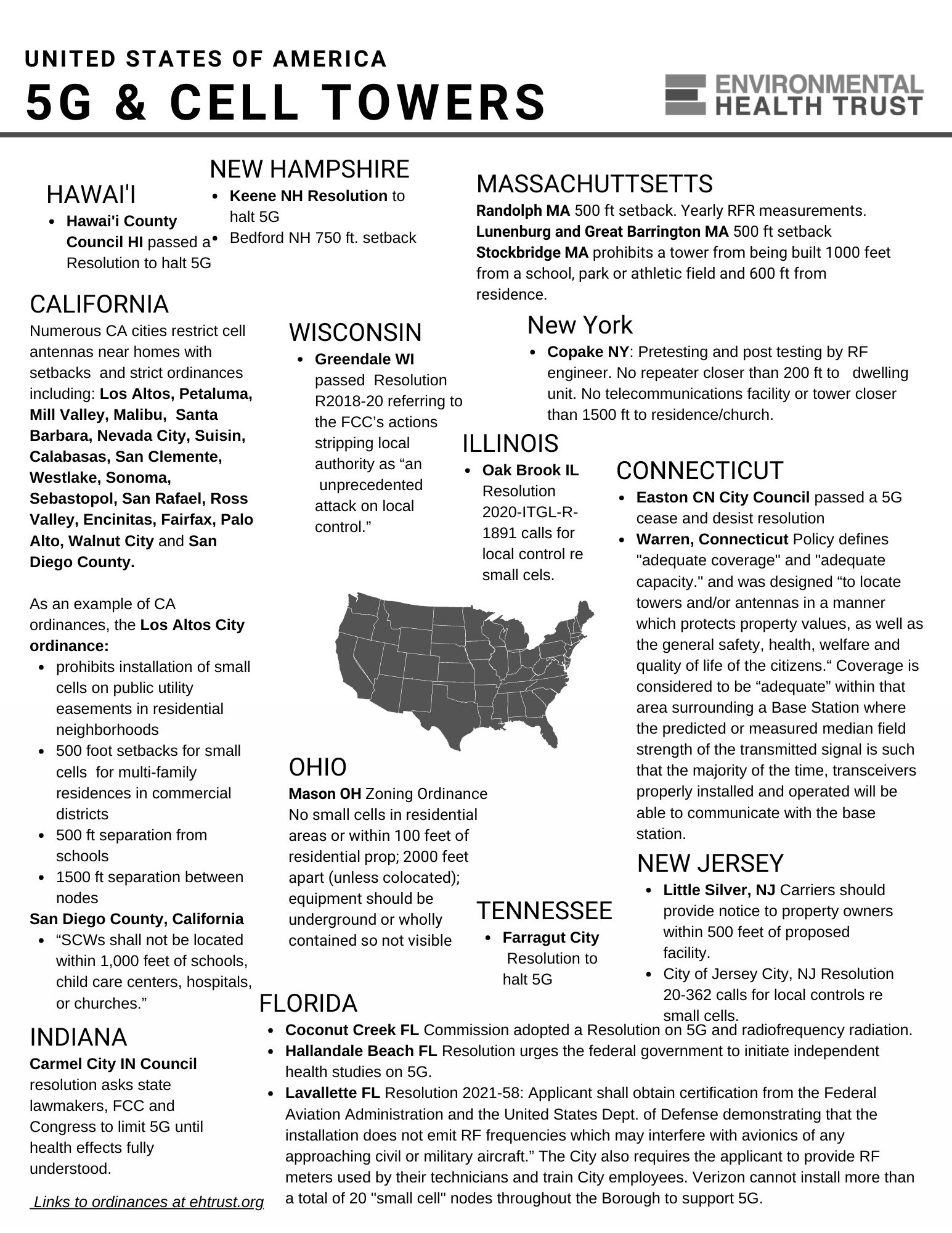 By B.N. Frank
By B.N. Frank
American opposition to 4G and 5G small cell installation continues to increase due to concerns about reduced property value (see 1, 2, 3), public safety (see 1, 2, 3, 4, 5, 6, 7), health (see 1, 2, 3, 4, 5, 6, 7, 8), cybersecurity and environmental risks. Some have described deployment as a form of “environmental racism”.
Lawsuits have been filed against the Federal Communications Commission (FCC) for NOT protecting the public from unsafe and unwanted small cell and 5G installation on Earth (see 1, 2, 3, 4, 5, 6) and in space.
National Association of Telecommunications Officers and Advisors (NATOA) recently published a report recommending that the FCC give authority back to municipal governments.
From Environmental Health Trust:
Report: The Harmful Effects of Small Cell Preemption on Local Governments by the National Association of Telecommunications Officers and Advisors
Report: Stretched Thin and Feeling the Squeeze: The Harmful Effects of Small Cell Preemption on Local Governments
MARCH 2021 by the National Association of Telecommunications Officers and Advisors
NATOA recommends the FCC abandon the approach of the 2018 Small Cell Order; restore the authority of local governments to protect community health and safety; abandon ill-conceived fee caps; and shift the burden of proof back to the provider in disputes.
Press Release by NATOA: A new report released today from the National Association of Telecommunications Officers and Advisors (NATOA), with assistance from Communication Workers of America (CWA), spotlights the widespread harms of small cell preemption to cities, local governments and millions of low-income Americans nationwide who continue to lack broadband connectivity. The report, “Stretched Thin and Feeling the Squeeze: The Harmful Effects of Small Cell Preemption on Local Governments,” comes as the Federal Communications Commission gains Democratic leadership under newly appointed Acting Chair Jessica Rosenworcel.
Drawing on a survey of 48 local governments, the report finds that small cell preemption is having a negative impact on cities’ finances, creating challenges for public safety and hampering efforts to close the digital divide. These localities range in population from under 5,000 to over 500,000 and represent regions from the middle of the country to the coasts.
KEY FINDINGS:
- 40% of all localities report that preemption has resulted in a loss in revenue, including 56% of large localities.
- 83% of mid-size localities and 63% of large localities report increased staffing expenses.
- 57% report that providers have failed to restore roads, sidewalks, or other infrastructure to its original condition following installation at least once, including 38% that report it has happened multiple times.
- 52% report that companies have damaged public property at least once, including 31% that report it has happened multiple times.
- 56% of large localities report that if it weren’t for preemption, they would be pursuing digital divide initiatives that they currently are not.
- 40% report that installations have created accessibility issues at least once, and 33% report that they have had installations that endanger the public.
- 44% report that broadband and small cell companies have installed equipment without a permit.
- 38% of all localities and 50% of large localities have dealt with contractors lacking the proper licenses.
- 71% of localities have received complaints from residents about radio frequency (RF) emissions.
- 38% report receiving complaints from residents about installation issues on multiple occasions.
More key findings can be found in the report.
EXECUTIVE SUMMARY
State and federal preemption of local authority to regulate small cells is straining local governments at a time when they can ill afford it. This report from the National Association of Telecommunications Officers and Advisors (NATOA), with assistance from the Communications Workers of America (CWA), draws on a survey of local governments and examines the effect of small cell preemption.
Findings include:
- Localities are feeling the financial squeeze. Over half of all localities report that preemption has caused increased staffing expenses, for example, hiring new staff or increased overtime expenses. Larger localities feel the burden even more: 83% of mid-size localities and 63% of large localities report the same. One in two localities said that preemption had increased costs paid to consultants. Thirtyeight percent of localities report that preemption has resulted in increased costs for make-ready work.
- Local governments are stretched thin. Multiple localities report that preemption means that other work suffers – when wireless facilities have special legal status, other construction permits become second tier. Forty-four percent of localities report that shot clocks have resulted in negative effects.
- Local governments are facing new legal attacks, which burden already strained budgets. Multiple localities have faced litigation related to small wireless facilities, from San Francisco, CA to the Village of Lake Success, NY.
- History shows that without accountability, broadband and small cell companies will treat the rights-of-way like the wild west. Forty-four percent of localities report that companies have installed equipment without a permit. Fifty-two percent report that companies have damaged public property at least once. Fifty-seven percent of localities report that providers have failed to restore roads, sidewalks, or other infrastructure to its original condition following installation at least once, including 38% of localities that report it has happened multiple times. Half of large localities report that providers have failed to restore infrastructure to its original condition on multiple occasions.
- Substandard installations affect the public. Forty percent of localities report that installations have created accessibility issues at least once, and a third report that they have had installations that endanger the public. Thirty-eight percent of all localities, and 50% of large localities, have dealt with contractors lacking the proper licenses.
- Preemption hurts digital equity efforts. Thirty-five percent of all localities, and over half of large localities, report that if it weren’t for preemption, they would be pursuing digital divide initiatives that they currently are not. Effective deployment that protects the public interest and furthers digital equity requires local government as a partner. NATOA recommends the FCC abandon the approach of the 2018 Small Cell Order; restore the authority of local governments to protect community health and safety; abandon ill-conceived fee caps; and shift the burden of proof back to the provider in disputes.
RECOMMENDATIONS
Effective deployment that protects the public interest must respect the role of local government as a partner. Policies should support local oversight and recognize that local governments are important stakeholders in achieving digital equity.
- The FCC should abandon the approach of the Small Cell Order and support the role of local governments in facilitating safe deployment in the public interest. Federal overreach into inherently local concerns doesn’t benefit the public or facilitate safe and equitable deployment.
- The FCC should abandon the Small Cell Order’s ill-conceived fee caps. Federal fee caps simply don’t make sense – they require local governments to navigate burdensome regulations to recoup costs, create needless litigation, and effectively shift deployment costs onto local governments and taxpayers.
- The FCC should shift the burden of proof back to the provider
when a provider alleges local government actions violate federal
The Small Cell Order created a punishing litigation standard for
a local government facing an alleged shot clock or fee cap violation.
The standard places localities, particularly small municipalities, under substantial litigation pressure, creates needless litigation, and stacks the deck against local governments in court and at the FCC. The burden to show a violation should rest with the provider. - The FCC should provide more resources to local governments on
RF emissions. Local governments are largely preempted with respect to RF emissions yet bear the brunt of local concerns about RF issues, including public and worker safety. The FCC should do more to educate the public and provide resources to localities to address residents’ questions and concerns.
Excerpts:
Has small cell preemption resulted in increased staffing expenses?
For example, new staff, overtime expenses
Large localities: Yes 63%, No 31%, Unsure 6%
Mid-size localities: Yes 83%, No 6%, Unsure 11%
Small localities: Yes 29%, No 21%, Unsure 50%
All localities: Yes 54%, No 31%, Unsure 15%
Has small cell preemption resulted in increased costs paid to consultants?
All localities: Yes 50%, No 29%, Unsure 21%
Percentages may not sum to 100 due to rounding.
Have you had issues with companies submitting incomplete applications or failing to provide the information required to make a permitting decision?
Large localities:
6% Yes, on one occasion
81% Yes, on multiple occasions 6% No
6% Unsure
Mid-size localities:
50% Yes, on at least one occasion 39% Yes, on multiple occasions 6% No
6% Unsure
Small localities:
21% Yes, on at least one occasion 36% Yes, on multiple occasions 21% No
21% Unsure
All localities:
27% Yes, on at least one occasion 52% Yes, on multiple occasions 10% No
10% Unsure
44% of localities report that companies have installed equipment without a permit
52% of localities report that companies have damaged public property, for example, damage to sewer covers or sidewalks
57% of localities report that companies have failed to restore roads, sidewalks, or other infrastructure to its original condition following installation
36% of localities have had issues with companies failing to use underground service alert services properly
“Providers dump everything on a contractor and contractors are only there to make money, not to do the right thing with regards to the right of way.”
56% of large localities report that installations have created accessibility issues at least once.
44% of large localities report an installation issue that has endangered the public, including one in four reporting it has occurred multiple times.
Seventy-one percent of localities have received complaints from residents about RF emissions.
Thirty-five percent of localities report that if preemption were not an issue, they would be pursuing digital divide initiates they currently are not.
 It’s worth noting that telecom experts, The Irregulators, also filed a lawsuit against the FCC. Americans have already paid to have safer high-speed internet via fiber optics (see also 1, 2, 3, 4) so the FCC should NOT be giving more tax payer dollars to telecom companies to “bridge the digital divide” (see 1, 2, 3). Additionally, Irregulator Bruce Kushnick insists that Big Telecom and Big Cable should be broken up immediately (see 1, 2).
It’s worth noting that telecom experts, The Irregulators, also filed a lawsuit against the FCC. Americans have already paid to have safer high-speed internet via fiber optics (see also 1, 2, 3, 4) so the FCC should NOT be giving more tax payer dollars to telecom companies to “bridge the digital divide” (see 1, 2, 3). Additionally, Irregulator Bruce Kushnick insists that Big Telecom and Big Cable should be broken up immediately (see 1, 2).
Opposition to 5G is worldwide and the majority of scientists oppose deployment. Americans opposed to 5G may sign and share this letter asking President Biden and Vice President Harris to stop installation.
Activist Post reports regularly about 5G and other unsafe technology. For more information visit our archives and the following websites.
- 5GCrisis
- 5GFree
- 5G Information
- 5G Space Appeal
- Stop 5G International
- What is 5G.info
- Electromagnetic Radiation Safety
- Environmental Health Trust
- Physicians for Safe Technology
- Scientists4WiredTech
- Wireless Information Network
Become a Patron!
Or support us at SubscribeStar
Donate cryptocurrency HERE
Subscribe to Activist Post for truth, peace, and freedom news. Follow us on Telegram, SoMee, HIVE, Flote, Minds, MeWe, Twitter, Gab and Ruqqus.
Provide, Protect and Profit from what’s coming! Get a free issue of Counter Markets today.

Be the first to comment on "Nat’l Assoc. of Telecom Officers and Advisors (NATOA) Says Local Gov’ts Should Have Authority in re Small Cell Deployment"